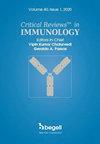TLR9 knockdown alleviates sepsis via disruption of the MyD88/NF-κB pathway activation
IF 0.9
4区 医学
Q4 IMMUNOLOGY
引用次数: 0
Abstract
Sepsis is a life-threatening organ dysfunction due to dysregulated host response to infection, accompanied by a high rate of mortality worldwide. During sepsis progression, toll-like receptors (TLRs) play essential roles in the aberrant inflammatory response that contributes to sepsis-related mortality. Here, we demonstrated a critical role of TLR9 in the progression of sepsis. A septic mouse model was established by cecal ligation and puncture (CLP), then administered with lentivirus encoding si-TLR9/LY294002. TLR9 protein expression and p65 nuclear translocation level/TLR9 protein positive expression/interaction between TLR9 and MyD88 in the intestinal tissues were examined by Western blot/immunohistochemistry/Co-IP assays. Serum levels of pro-inflammatory factors (IL-6, TNF-α) as well as bacterial contents in the liver/spleen/mesenteric lymph nodes (MLN) were measured by ELISA and bacterial mobility assay. TLR9 expression was augmented in the intestinal tissues, TLR9 and MyD88 interaction was enhanced, nuclear p65 protein level was increased, cytoplasmic p65 protein level was decreased, and the MyD88/NF-κB pathway was activated in CLP-induced septic mice, while TLR9 knockout protected against CLP-induced sepsis via the MyD88/NF-κB pathway inactivation. Briefly, TLR9 inhibition-mediated protection against CLP-induced sepsis was associated with a reduction in pro-inflammatory cytokine release and a promotion of bacterial clearance via a mechanism involving the MyD88/NF-κB pathway inactivation.TLR9敲低可通过破坏MyD88/NF-κB通路激活来减轻脓毒症
脓毒症是一种危及生命的器官功能障碍,由于宿主对感染的反应失调,伴随着世界范围内的高死亡率。在脓毒症进展过程中,toll样受体(TLRs)在导致脓毒症相关死亡的异常炎症反应中发挥重要作用。在这里,我们证明了TLR9在败血症进展中的关键作用。采用盲肠结扎穿刺法(CLP)建立脓毒症小鼠模型,并用编码si-TLR9/LY294002的慢病毒给药。Western blot/免疫组化/Co-IP检测小肠组织中TLR9蛋白表达和p65核易位水平/TLR9蛋白阳性表达/TLR9与MyD88的相互作用。采用酶联免疫吸附试验(ELISA)和细菌迁移率法检测血清促炎因子(IL-6、TNF-α)水平及肝/脾/肠系膜淋巴结(MLN)细菌含量。TLR9在肠道组织中的表达增强,TLR9与MyD88的相互作用增强,细胞核p65蛋白水平升高,胞质p65蛋白水平降低,clp诱导的脓毒症小鼠MyD88/NF-κB通路被激活,而TLR9敲除通过MyD88/NF-κB通路失活来保护clp诱导的脓毒症。简而言之,TLR9抑制介导的对clp诱导的脓毒症的保护与促炎细胞因子释放减少和促进细菌清除有关,其机制涉及MyD88/NF-κB途径失活。
本文章由计算机程序翻译,如有差异,请以英文原文为准。
求助全文
约1分钟内获得全文
求助全文
来源期刊
CiteScore
2.60
自引率
0.00%
发文量
14
审稿时长
>12 weeks
期刊介绍:
Immunology covers a broad spectrum of investigations at the genes, molecular, cellular, organ and system levels to reveal defense mechanisms against pathogens as well as protection against tumors and autoimmune diseases. The great advances in immunology in recent years make this field one of the most dynamic and rapidly growing in medical sciences. Critical ReviewsTM in Immunology (CRI) seeks to present a balanced overview of contemporary adaptive and innate immune responses related to autoimmunity, tumor, microbe, transplantation, neuroimmunology, immune regulation and immunotherapy from basic to translational aspects in health and disease. The articles that appear in CRI are mostly obtained by invitations to active investigators. But the journal will also consider proposals from the scientific community. Interested investigators should send their inquiries to the editor before submitting a manuscript.

 求助内容:
求助内容: 应助结果提醒方式:
应助结果提醒方式:


